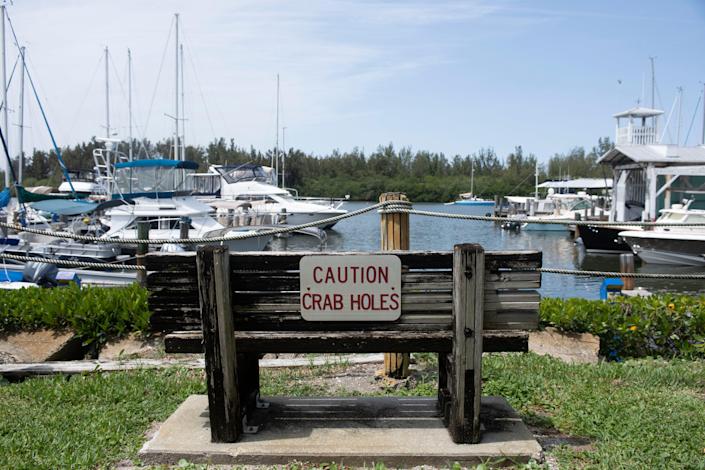Indian River Neighborhood Association weighs in on Vero’s marina plan
The Indian River Neighborhood Association believes improvements to the marina are necessary to operate it as a desirable asset for Vero Beach. After an in-depth study of the our city’s Marina Master Plan, we share the following recommendations, already made to city council and marina staff.
We support moderate expansion of the dry storage facility to accommodate larger boats, and to increase revenue to make the marina a self-supporting enterprise with enough funds for ongoing maintenance. The design should minimize the environmental impacts of tree removal and noise pollution due to the location in a residential neighborhood. Use low-impact design principles when constructing the dry storage building to protect the lagoon from stormwater run-off.
Improve the launching facility for non-motorized vessels such as kayaks and canoes.
Explore the possibility of other nutrient reduction projects (oyster bags, etc.) at lagoon outfalls north of the marina. Collaborate with the Florida Inland Navigation District) to use a county dredge material maintenance area for muck deposits removed from the marina.
Consider working with the county to develop a county-wide muck map for the lagoon for future hydraulic dredging. In time the city could join the FIND and the state for grant funding of muck mitigation projects.
The upcoming workshop on May 5 pertains only to South Dock improvements. However, we have concerns about other future plans:
The scale of expansion in the small lagoon;
Installation of docks behind the dog park along the southern shore.
We recognize and applaud the positive aspects of having pump-outs at every slip and the availability of a pump-out boat for moored vessels.
All interested parties should participate in the May 5 workshop at 6 p.m. at City Hall. Citizen involvement is important.
Mike Johannsen, Vero Beach, is the chairman of the Indian River Neighborhood Association.


Local resistance to change follows a predictable, common pattern
Larry Reisman’s April 24 column in the Press Journal was about the local opposition to the plans to replace old Vero Beach City Marina structures. His words reminded me of the local resistance to other Vero Beach changes that have happened over the years: Humiston Park renovation, Jungle Trail natural growth set-aside bordering the residential development, the Vero Beach Dog Park development, Brightline, and pickleball courts at Riverside Park.
There is a common thread that runs through this reoccurring opposition:
Oppose change because it’s change.
Use whatever it takes to seemingly help build a case for opposing, regardless of merit (noise).
Pack the public hearings with uninformed supporters.
Push the resistance with unending spending, sometimes at taxpayer expense (Brightline)
Don’t suggest meaningful alternatives.
Consider this quote from the back cover of a Sinclair Lewis’ novel “Main Street.” The novel “attacks the drab complacency and ingrown mores of those who resist change, who are under the illusion they have chosen their tradition.”
Jim Cohoe, Vero Beach
Police officers need training more focused on de-escalation
On March 26, two Indian River County Sheriff’s deputies shot and killed a patient presenting mental health issues at Cleveland Clinic Indian River Hospital. The irony of this tragedy is unmistakable: An individual needing medical attention is killed by police — pledged to serve and protect — while awaiting treatment in a hospital chartered to save lives.
Approximately 10% of U.S. police calls are related to mental health, and one in four people shot and killed by police between 2015 and 2020 showed signs of mental illness (Council of Foreign Relations).
In Europe, many countries have created specialized units to respond to mental health emergencies. In Eugene, Oregon, unarmed medics and crisis professionals respond to 911 calls related to individuals experiencing psychological crises.
In the United Kingdom, Germany and most Scandinavian countries, firearms training focuses on how to avoid using deadly force, while Japanese officers are trained to use martial arts techniques rather than weapons to subdue individuals exhibiting signs of mental illness.
Other advanced democracies organize, fund, train, arm and discipline their police officers differently than the U.S. does. Recruits in this country spend much less time in police academies than their European counterparts. While basic training here averages 21 weeks, similar European programs can take more than three years and include university degrees in criminal justice and related fields. In the U.S., most municipal police forces require only a high school diploma or its equivalent.
On average, U.S, police academies spend three-quarters of their training on firearms skills. The remaining time — approximately four weeks — is devoted to de-escalation and crisis intervention training.
The U.S. must do better. Congress should establish national standards for all police academies, providing adequate funding to train adequately every police officer in effective de-escalation and crisis-intervention procedures.
Cray Little, Vero Beach


A question: Would Putin have invaded Ukraine if Trump were still POTUS?
Donald Trump and Vladimir Putin! Maybe they are alike in instability.
Would Putin have invaded Ukraine if Trump were still at the helm in the United States? I think not.
Trump may have been somewhat unpredictable but he knew how to posture, predict, negotiate and run a big business operation. In addition, he was somewhat of a loose cannon. In general, loose cannons need to respect each other for obvious reasons.
Putin is a tough KGB dude but he knows when to hold ’em and when to fold ’em. My belief is that Putin would have held back until a more predictable response could be expected.
Hmm — a good plan and it worked. Putin got exactly what h was looking for from our present predictable and ineffective administration.
Gary M. Lavorgna, Vero Beach
This article originally appeared on Treasure Coast Newspapers: Letters to the Editor: May 4, 2022




